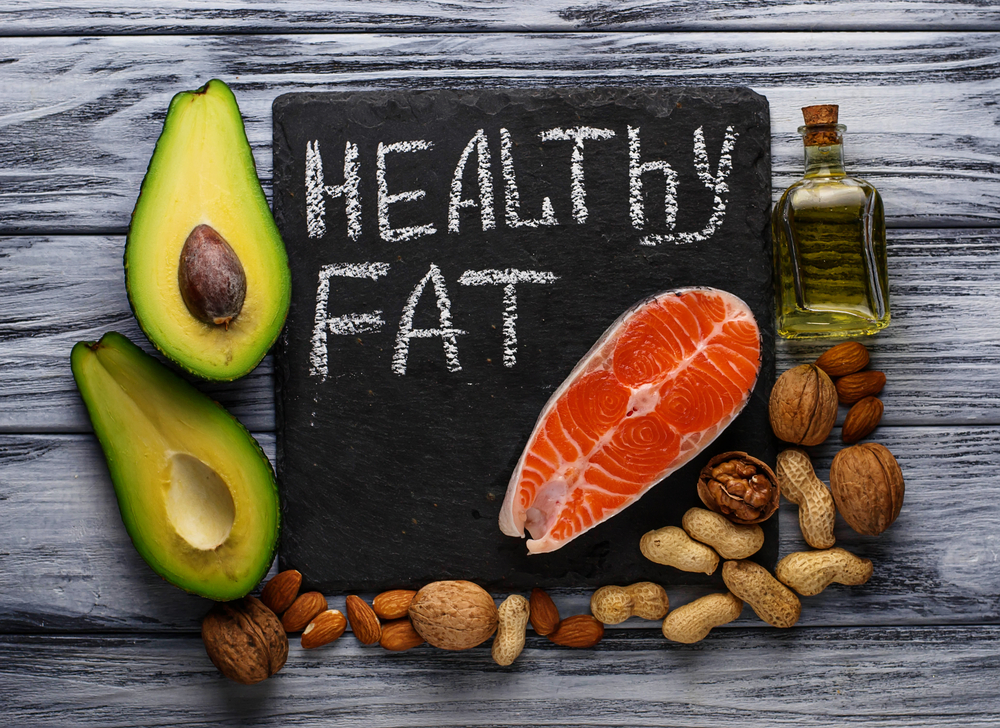
This is the fifth post in a series on some of the physiological (non-psychological) causes of depression and/or anxiety.
The fats we choose to eat have a big impact on the function of every cell of our body, including those in the brain, where neurotransmitters involved in mood regulation are synthesised. The brain is made primarily of fatty acids, and the fat we eat is incorporated into brain cells as well as all other cells in our body.
Every cell has a membrane around the outside that consists mostly of fat, with some proteins. In order for a cell to work properly, its membrane needs to have the right fluidity and flexibility. This is so that the right messages, from certain neurotransmitters and hormones, and the right nutrients, can pass back and forth, and also for proper communication between cells. Thus, the quality of the cell membrane is critical for brain function, mood and general health.
In a nut shell, a healthy cell membrane equals healthy cell function, and in places like the brain it means that the right messages are able to get through (e.g. messages of happiness, pleasure, motivation, focus, calmness and tranquillity).
The fatty acids found in good fats from foods such as olive oil, fish, nuts, seeds, avocado and coconut oil, provide proper cell membrane fluidity and flexibility. On the other hand, processed food such as chips, cereals, margarine, biscuits, crackers and foods containing hydrogenated oils, all contain seed and plant oils that are unstable and easily damaged. When processed and heated, these oils become harmful. These fatty acids replace the healthful fatty acids and lead to rigid and unresponsive cell membranes. This then results in malfunctioning neurons (brain cells), inflammation and poor communication between cells. The end result is poor regulation of mood that can lead to conditions like depression and anxiety.
Avoiding processed food as much as possible goes a long way to improving the balance of fatty acids in favour of the good fatty acids and therefore the function of our cells.
Certain beneficial fatty acids, known as Omega-3s, have been shown in a number of clinical studies to alleviate conditions such as depression. The particular omega-3 fatty acids in question are eicosapentaenoic acid (EPA) and docosahexaenoic acid (DHA). Ways to increase the Omega-3 fatty acid profile in our diet involves the consumption of foods such as deep water oily fish (salmon, sardines, herring, tuna, anchovies, mackerel), flaxseeds, chia seeds, grass-fed beef, avocados and pastured eggs.
A note on vegetarian sources of Omega-3s: While some kinds of omega-3 are found in certain vegetarian foods (flaxseed, chia seeds, walnuts, etc.), the two specific omega-3s, EPA and DHA, are only found in fish and marine algae, with small to moderate amounts also found in grass-fed meat. When it comes to nuts and seeds, the body has to go through a conversion process before EPA and DHA can be acquired from these sources. A lot of individuals have trouble with this conversion, so don't rely solely on those vegetarian foods for your EPA and DHA needs.
Supplementing with fish oils is also a viable option. For optimal absorption, these should be taken with a meal that includes good fats. The other important thing to remember when choosing a fish oil is that quality is key. Cheap fish oils are often rancid and oxidised, and may also contain heavy metals (e.g. mercury) and other contaminants. If you need assistance on which fish oil is appropriate for you, and at what dose, seek the advice of a qualified naturopath or nutritionist.
One final note on fish oils: there are instances where supplementing can actually cause more harm than good. This is because some individuals need the right balance between the various Omega-3s and other fatty acids. This situation occurs in individuals with pyrrole disorder. This disorder, also known as pyroluria, is estimated to affect a significant percentage of those with mental health conditions.
I will be discussing this condition in detail in my next post of this series.
If you suffer from anxiety and/or depression and want to find out more about how good fats can support your mood, please contact me to make your appointment for an individualised naturopathic consultation.
Yours in Health,
Micaela
References
Gropper, s, Smith, J, Groff, J. 2009, Advanced Nutrition and Human Metabolism, 5th edn., Wadsworth Cengage Learning, CA.
Grosso, G., Pajak, A., Marventano, S., Castellano, S., Galvano, F., Bucolo, C., Drago, F. and Caraci, F., 2014. Role of omega-3 fatty acids in the treatment of depressive disorders: a comprehensive meta-analysis of randomized clinical trials. PloS one, 9(5), p. e96905.
iska, D., Quinn, s., Lukaczer, D., Jones, D., Lerman, R. 2004, Clinical Nutrition-a Functional Approach, 2nd edn., The Institute for Functional Medicine, Washington, USA.
Parker, G., Gibson, N.A., Brotchie, H., Heruc, G., Rees, A.M., Hadzi-Pavlovic, D. and Psychol, M., 2006. Omega-3 fatty acids and mood disorders. American Journal of Psychiatry.
Ruxton, C.H.S., Reed, S.C., Simpson, M.J.A. and Millington, K.J., 2004. The health benefits of omega‐3 polyunsaturated fatty acids: a review of the evidence. Journal of Human Nutrition and Dietetics, 17(5), pp. 449-459.
Sinclair, A., Begg, D., Mathai, M. and Weisinger, R., 2007. Omega 3 fatty acids and the brain: review of studies in depression. Asia Pacific journal of clinical nutrition, 16(1), pp. 391-397.